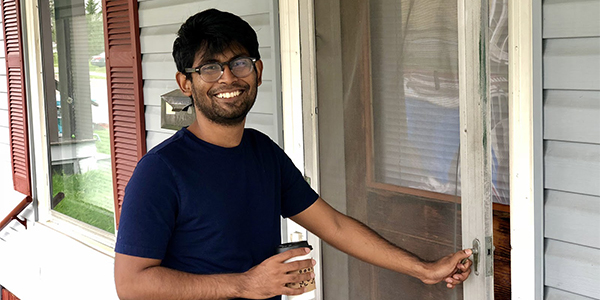Moving off campus? Let Binghamton Code Enforcement help you out!
Students can utilize Code Enforcement Department expertise before signing a lease to live off campus.

Moving off campus can be daunting. For many, it can mean signing your first lease, getting your first apartment and having your very first home-away-from-home.
Binghamton University students have a plethora of apartments and neighborhoods to choose from, but sometimes, students feel underprepared heading into the housing process.
Shehtab Zaman, a senior majoring in physics, has lived in four different homes during his few years of off-campus living in Binghamton. While he has enjoyed his time off campus, he admits that there are some things he still doesn’t know about being a renter, and certainly didn’t know before signing his first lease.
“I don’t know what my house is required to have,” Zaman said. “I feel like I should have certain things, like a smoke detector or a working boiler, but I’m not sure what the requirements are, who needs to pay for what and who enforces this stuff.”
Zaman is one of many students who could benefit from the assistance of the City of Binghamton Code Enforcement Department. Not only does it provide a wealth of knowledge regarding what landlords must provide, but it can help you ensure that your apartment is up to code even before you sign a lease.
“Do not sign a lease before you call code,” said Tom Costello, supervisor of the Building Construction, Zoning and Code Enforcement Department. “We’ll perform a free compliance inspection on an apartment. You don’t need to be a tenant to request that.”
Students looking to sign a lease off campus don’t have a high awareness of code enforcement. Costello believes that students can use his office to ensure that student sign leases for quality homes.
“Ask the landlord, ‘Do you have a recent inspection report?” If not, you can reach out to code and we can legally provide that for you,” Costello said. “If no inspection has been done, ask the landlords if they mind if you have an inspection done before you sign the lease. If they don’t mind, which they shouldn’t, that’s good. If they do mind, there may be a problem. These are telling questions. I’ve never had anyone who owned well-managed property show any anxiety about their relationship with my department.”
According to Zaman, getting a free inspection done before signing a lease in the past would have saved him a lot of headaches.
“I had never heard of code enforcement, but I wish I had years ago. I was never informed by the landlord about how the heat didn’t work efficiently or how the windows didn’t really work well or close properly. And of course, I didn’t know until December rolled around,” Zaman said. “Now I know to absolutely get an inspection before signing a lease in the future. If I’m signing a lease for 12 months or more, I’d like to know that the property I’m getting is up to par. It just makes sense.”
Landlords in the community who rent to students are typically responsive to the Code Enforcement Department. They typically have 30 days to correct a violation, unless that violation presents an imminent danger to the tenant or occupant. For example, a landlord doesn’t get 30 days to put a battery in a smoke alarm, but probably will get 30 days to fix up a porch.
“When you tour an apartment, it’s usually quite rushed,” said Zaman. “To have a professional come in and and inspect it would be fantastic. If you go to buy a used car, you take it to the mechanic. For some reason, students don’t have that philosophy when finding their home.
Here are some tips from the Code Enforcement Department to consider when touring different off-campus apartments:
- Look at the general condition of the property relative to the rest of the neighborhood.
- Is the neighborhood generally in reasonable condition? Does this house make you feel confident?
- If you look at the roof and it’s in good condition, that’s a really good sign. If someone’s maintaining a roof properly, that means they’re investing effectively in the property.
- Look at steps, porches, hand railings – the things you need to travel over every day. If they look funny to you, if they’re broken, if they’re deteriorated, that’s not a good sign.
- Look at windows and doors and see if they’re air tight and energy efficient. Are they painted? Does the door stick or not close properly? You can tell a lot before you even enter the property.
- Check the ceiling to see if smoke and carbon monoxide detectors are installed. Look for water stains on the plaster. Look at the walls and see if they’re squared, straight and true.
- Check out the floors. Are they level and even? Would you walk across it barefoot without any anxiety?
- Go into the kitchen and bathroom and make sure the appliances all function properly. Make sure there’s no evidence of water stains or mold. Flush the toilet.
To contact the Code Enforcement Department, call 607-772-7004. To submit a service request or complaint, call 607-772-7010.

